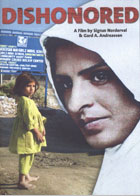
Dishonored 2008
Distributed by Icarus Films, 32 Court St., 21st Floor, Brooklyn, NY 11201; 800-876-1710
Produced by Sigrun Norderval & Gard A. Andreassen
Directed by Sigrun Norderval & Gard A. Andreassen
DVD, color, 52 min.
Jr. High - Adult
Human Rights, Women's Studies, Women's Roles in Activism, Criminal Justice, Gender Studies
Date Entered: 04/08/2009
Reviewed by Malcolm L. Rigsby, Department of Sociology, Ouachita Baptist University, Arkadelphia, ARAstounding! What an ironic introduction and yet so truly heroic as to be named Glamour’s 2005 Woman of the Year! After being raped and then being expected to kill herself this is the story of Mukhtar, the woman who showed the world the real meaning of “honor.” (Brooke Shields)
The setting is Pakistan, 2002. Mukhtar is a mother and wife whose life was forever changed. How did this happen? Mukhtar’s brother (Shaqoor, age 12, a member of the Mai clan) insulted and brought dishonor upon a very influential, neighboring family (the Mastois clan) by an incident with their daughter (Salma). The council is convened with an imam in charge trying to negotiate a settlement. The dishonored clan orders that a woman of Shaqoor’s family make some sort of “apology”. Mukhtar is chosen to come forward. Her plead to forgive her bother is ignored and the dishonored clan cry for retribution—rape of Mukhtar. The presumed result—such dishonor that she will kill herself.
The story unfolds with an excellent discussion of Pakistani chastity and cultural norms for girls, boys, men and women. Interviews with human rights activists as well as politicians and religious leaders are evaluated. The historic and cultural role of the Panchayat is discussed in relation to the justice system.
At first Mukhtar is desirous of suicide and prays for strength to do so. Her attempts are unsuccessful. In deciding not to kill herself, she finds the only way she can regain honor and live is to make the incident known and seek retribution. The family is against this public display, the police refuse to investigate; only a journalist becomes interested in the events (Maureed Abbas). Under the 1979 law, her going to the police requires her to subject herself to death for having sex outside of marriage and makes the proof of rape extremely difficult to meet. Mukhtar and her family are placed in jail and her statement of rape changed to reflect that no rape occurred.
This documentary takes the viewer through the legal system and cultural system that suppresses women’s rights. Law is not respected. Finally with assistance of the British press the rape is condemned and investigations begun. In August, the men are arrested for terrorism and tried. Bias and prejudice are brought out in this film.
While Mukhtar undergoes the rigors of this legal process human rights advocates and women’s rights groups use her story as an opportunity to gain exposure. In her efforts, the men are sentenced to death. (Later the viewer follows the “retrial” of these men and the reversal of their convictions and acquittal.) All of this is bittersweet. As an effort to protect her from future aggression, she was offered visas to Canada and the U.S., however she refused. Instead, she returns home and with the money she received in the court verdict opens schools, one for girls and one for boys.
However, this is the beginning. Follow this story as the media and many individuals help Mukhtar bring education to the people of her village. International focus on Mukhtar has led to opening opportunities for women of abuse to come forward and seek help. The government has attempted to “quiet” her in an effort to protect the name of Pakistan. Statistics are not accurate but many new types of violence have broken out against women.
After the appeal on the rape trial, the men are freed. Mukhtar leaves Pakistan and goes to France where her autobiography is scheduled and on to the United States where she is supported by several NGO’s and begins to speak internationally.
A story of conviction. A story of changing reality. A must see.
“End oppression with education.” --Mukhtar Mai.
Excellent sound, photography and editing. The eight chapter segments are very helpful for those wishing to review and reexamine a particular segment of the film.